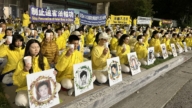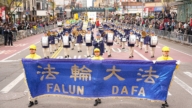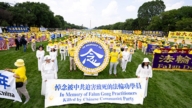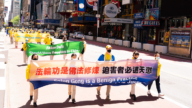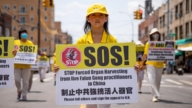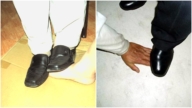【新唐人2013年12月25日讯】中共十二届人大常委会第六次会议,目前正在审议包括“废止劳动制度”等多项议案。中共十八届“三中全会”11月召开后,已宣布废止延用半个多世纪的邪恶劳教制度。但有律师指出,遍及中国各地的洗脑班、黑监狱等机关,仍延续着劳教制度的迫害手段。
12月23号至28号,中共十二届全国人大常委会第六次会议在北京召开。会议将审议包括关于提请废止《国务院关于劳动教养问题的决定》和《国务院关于劳动教养的补充规定》等议案。
“劳教制度”是中共上世纪50年代,从前苏联引进的一个专门迫害人权的非法措施。1955年首次登上历史舞台,当时是为了肃清所谓“暗藏的反革命分子”。1957年,中共颁布了《关于劳动教养问题的决定》。
中国资深法学专家赵远明指出,“劳教制度”自实施后,在“反右”、“严打”、“维稳”等各阶段,充当着践踏人权、迫害民众的罪恶工具,造成冤假错案层出不穷,冤民遍地。
赵远明:“尤其到了99年江泽民镇压法轮功以来,他利用这个劳教制度大肆的关押迫害,迫害甚至于杀戮法轮功弟子,当然还有异议人士,其他宗教人士,这样的话,就曝露出这个劳教问题越来越多。”
赵远明指出,臭名昭著的“劳教制度”还是一个违法、违宪的恶法。自99年前党魁江泽民迫害法轮功后,大量往劳教所输血,使得劳教所成了实施酷刑、活摘人体器官的人间地狱。
99年,江泽民集团不惜动用中国经济资源的四分之一,来镇压这个修炼“真、善、忍”的群体。中国各地的劳教所,更是利用集古今中外之大全的迫害手段,从迫害法轮功团体扩展到普通民众身上。
今年4月,大陆《财经》杂志刊登了两万字的纪实报导《走出“马三家”》,亲历者口述“马三家劳教所”人间地狱般的酷刑折磨﹔而中国独立制片人杜斌的记录片《小鬼头上的女人》,也揭露了遍布中国各地大大小小的劳教所里,惨绝人寰的各种酷刑黑幕。
中共“劳教制度”的罪行,引发国际的震惊和愤怒。在舆论的压力下,大陆各地的劳教所开始悄然换牌,并悄悄释放被关押的劳教人员。
11月15号,中共十八届三中全会通过的《决定》文,正式提出废止劳动教养制度。
大陆法轮功学员徐立:“中共的劳教迫害已走到了尽头,但是,中共的邪恶本质并没有改变,依然以其他的形式,比如洗脑班,黑监狱,还有以各种形式跟踪、监听迫害法轮功学员。”
大陆维权律师江天勇说,劳教制度被废止,但劳教所的替代品“洗脑班”、“黑监狱”仍大量存在。这一个月来被绑架、抓捕的法轮功学员仍在增加。
大陆维权律师 江天勇:“一个人走在大街上,给你拉到一个面包车里面就送到里面去,家属根本不知道人到哪里了,即使根据推测找到了那个地方,那个地方也不会承认人关在里边。”
海外“法轮大法”《明慧网》披露,今年上半年,中国法轮功学员被判或送洗脑班的人数,是劳教人数的45倍。
11月19号,大陆83名维权律师就“废止劳教制度”发表声明,律师们首次提出国家赔偿问题,以及全面取缔“法制教育基地”、“法制学习班”等洗脑班及黑监狱对民众的变相劳教。
12月17号,国际特赦发表报告,对中共宣称的取消劳教制度表示怀疑。并指出,中共仍然在寻求新的办法来惩罚同一类人,所谓“取消劳教制度”只能是“换汤不换药”。
采访编辑/李韵 后制/孙宁
China’s Brainwashing Centers Continue Labor Camp Persecution
The National People’s Congress has been
discussing a motion to abolish China’s
re-ecucation through labor camp system.
Many lawyers highlight that brainwashing
centers and black jails still exist in China.
These will be places to continue the oppression and
persecution that has taken place in the labour camps.
The sixth meeting of the 12th National People’s Congress
will be taking place in Beijing from December 23 to 28.
The committee began discussing motions,
including the State Council decision on the
re-education through forced labour system.
The re-education through labor system, known as
Laogai, or labour camps, are an illegal apparatus.
This system was adopted from the former
Soviet Union, as a place to conduct persecution.
It was first used by the Chinese Communist Party
(CCP) in 1955, to punish counter-revolutionaries.
In 1957, the CCP officially adopted the system.
Legal specialist Zhao Yuanming indicates that since
the implementation of the labor camps, the CCP has
manipulated the system to persecute Chinese people.
This has happened throughout the
history of the CCP’s political movements.
It has been the source of endless suffering
of victims of miscarriages of justice.
Zhao Yuanming: “In particular, Jiang Zemin
abused the system to the extreme, during his
persecution of Falun Gong, which began in 1999.
The labor camps have been used to detain,
torture and kill Falun Gong practitioners,
dissidents, and people of different faiths.
Many more crimes associated with the
labor camps have also been exposed."
Zhao Yuanming highlights the notoriety of the labor camps,
describing them as illegal, unconstitutional and draconian.
Since Jiang Zemin launched the persecution
against Falun Gong in 1999, he has transferred a
large amount of funds to the labour camp system.
It has become a living hell of
torture and live organ harvesting.
In 1999, Jiang Zemin mobilized a quarter of all state resources.
This was in order to suppress Falun Gong’s practice
of “Truthfulness, Compassion and Forbearance."
Labor camps throughout China have seen
all means of persecution unfold within them.
The system also extended it’s methods from
Falun Gong practitioners to the Chinese citizens.
In April 2013, Lens magazine published
an article called “Out of Masanjia".
It documented the torture seen by eyewitnesses
within the notorious Masanjia Labour Camp.
Independent filmmaker Du Bin also produced
a documentary called, “Above the Ghosts’
Heads: The Women of Masanjia Labour Camp".
This further revealed brutal torture
in labor camps across China.
Falun Gong practitioner Xu Li has
been repeatedly sent to labor camps.
Exposing the crimes and brutality in the CCP’s labor camps
has shocked and stirred the international community.
Under pressure of public opinion, labor camps across China
started to take down their signs, and to release detainees.
On November 15, there was a decision
published from the Third Plenary Session.
It formally proposed to abolish the labor camp system.
Xu Li, Falun Gong practitioner in China: “The labor
camps have gone to the extreme and to the end.
But, the evil nature of the CCP has not changed. The
labor camp system still exists in China, only in disguise.
It still exists in the brainwashing centers and black jails.
It also exists in the spying and monitoring systems that
have been established in the persecution of Falun Gong."
Human rights lawyer Jiang Tianyong says that even though
the labor camp system is disbanding, alternative labor camps
exist, largely as the brainwashing centers and black jails.
For more than a month after the abolition
of labor camps, the number of Falun Gong
practitioners arrested was still increasing.
Jiang Tianyong: “They would simply pull you into a van
while you’re walking on the street and lock you up.
Your family would not know where you were.
Even if your family were able to work out where you were,
no one would confirm it, and you would remain locked up."
Data revealed by overseas website Minghui.org,
suggests the number of Falun Gong practitioners sent
to brainwashing centers during the first half of 2013
was 45 times the number sent to the labor camps.
On November 19, a statement issued by 83 human rights
lawyers in China called for the abolition of labor camps.
The document also put forward for the first time
the issue of compensation from the state.
Lawyers requested to ban all forms of disguised detention.
This includes black jails and, brainwashing
centers, which work under the name of legal
education centers, or legal education classes.
On December 17, Amnesty International questioned the CCP’s
proposal for abolishing re-education through labour in China.
It said it is an approach which is
“changing the soup, but not the medicine."
Interview & Edit/LiYun Post-Production/SunNing


